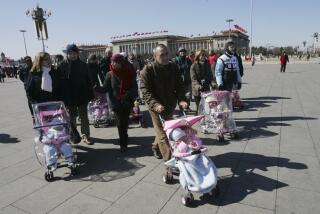Inhuman Neglect in China’s Orphanages
- Share via
If the intent of Chinese officials who conducted a press tour of a Shanghai orphanage was to dispel questions about child neglect, their mission was not convincing. They failed to answer a number of questions raised by a new Human Rights Watch / Asia report charging alarmingly high death rates and deliberate starvation of children at the Shanghai Children’s Welfare Institute between 1988 and 1993. China suffers a credibility gap. Inhuman treatment of children is chilling, and it could put a freeze on Chinese ambitions to shore up their international standing and goals.
The report, “Death by Default: A Policy of Fatal Neglect in China’s State Orphanages,” looks into alleged inhumane treatment and neglect of children abandoned by their parents. Under China’s “one family, one child” policy, boys are prized for their future economic prospects while girls are considered a burden and often cast out by families who want to try again for a male child.
In recent years, many of these abandoned children have found homes in the United States and other countries. The less fortunate, if they survive abandonment, end up in state orphanages. The human rights report says the death-to-admissions ratio for babies taken to the Shanghai institute probably ran as high as 90% in the late 1980s and early 1990s. Hundreds of severely retarded or disabled children were left to die without care under a policy euphemistically entitled “summary resolutions,” the report charges.
To counter the report, Chinese officials allowed 20 foreign correspondents, including Times correspondent Rone Tempest, to visit the Shanghai facility on Monday. They repeatedly asked for a detailed, year-by-year accounting of the mortality rate at the orphanage, but to no avail. Chinese officials also denied reporters’ requests to visit the Shanghai No. 2 Social Welfare Institute located on an island a two-hour ferry ride away from Shanghai. The Human Rights Watch report said that children abandoned because they were considered hopelessly disabled had been housed on the island.
As long as Chinese officials refuse to make data available or allow a visit to the island, independent assessment of the orphanage’s performance is not possible. The human rights report was based on the testimony and records of a former physician at the institute.
China’s oppressive “one child” policy, designed to rein in the growth rate of the world’s largest population, has huge social costs. The once-isolated Beijing regime could largely conceal them, but can no longer since China has opened up to Western trade and development. Now human rights have been put in the balance with trade, and the haunting cries of children should be louder than the buck.
More to Read
Sign up for Essential California
The most important California stories and recommendations in your inbox every morning.
You may occasionally receive promotional content from the Los Angeles Times.













